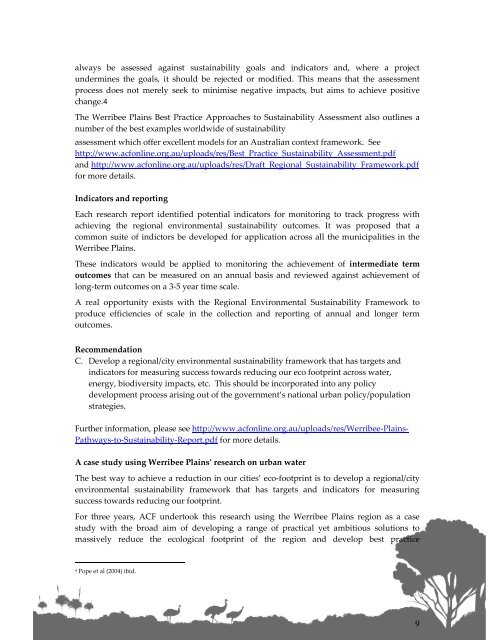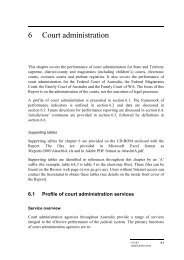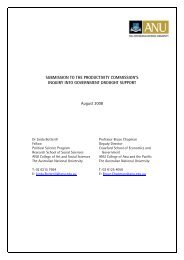Australian Conservation Foundation - Productivity Commission
Australian Conservation Foundation - Productivity Commission
Australian Conservation Foundation - Productivity Commission
Create successful ePaper yourself
Turn your PDF publications into a flip-book with our unique Google optimized e-Paper software.
always be assessed against sustainability goals and indicators and, where a project<br />
undermines the goals, it should be rejected or modified. This means that the assessment<br />
process does not merely seek to minimise negative impacts, but aims to achieve positive<br />
change.4<br />
The Werribee Plains Best Practice Approaches to Sustainability Assessment also outlines a<br />
number of the best examples worldwide of sustainability<br />
assessment which offer excellent models for an <strong>Australian</strong> context framework. See<br />
http://www.acfonline.org.au/uploads/res/Best Practice Sustainability Assessment.pdf<br />
and http://www.acfonline.org.au/uploads/res/Draft Regional Sustainability Framework.pdf<br />
for more details.<br />
Indicators and reporting<br />
Each research report identified potential indicators for monitoring to track progress with<br />
achieving the regional environmental sustainability outcomes. It was proposed that a<br />
common suite of indictors be developed for application across all the municipalities in the<br />
Werribee Plains.<br />
These indicators would be applied to monitoring the achievement of intermediate term<br />
outcomes that can be measured on an annual basis and reviewed against achievement of<br />
long-term outcomes on a 3-5 year time scale.<br />
A real opportunity exists with the Regional Environmental Sustainability Framework to<br />
produce efficiencies of scale in the collection and reporting of annual and longer term<br />
outcomes.<br />
Recommendation<br />
C. Develop a regional/city environmental sustainability framework that has targets and<br />
indicators for measuring success towards reducing our eco footprint across water,<br />
energy, biodiversity impacts, etc. This should be incorporated into any policy<br />
development process arising out of the government’s national urban policy/population<br />
strategies.<br />
Further information, please see http://www.acfonline.org.au/uploads/res/Werribee-Plains-<br />
Pathways-to-Sustainability-Report.pdf for more details.<br />
A case study using Werribee Plains’ research on urban water<br />
The best way to achieve a reduction in our cities’ eco-footprint is to develop a regional/city<br />
environmental sustainability framework that has targets and indicators for measuring<br />
success towards reducing our footprint.<br />
For three years, ACF undertook this research using the Werribee Plains region as a case<br />
study with the broad aim of developing a range of practical yet ambitious solutions to<br />
massively reduce the ecological footprint of the region and develop best practice<br />
4<br />
Pope et al (2004) ibid.<br />
9
















